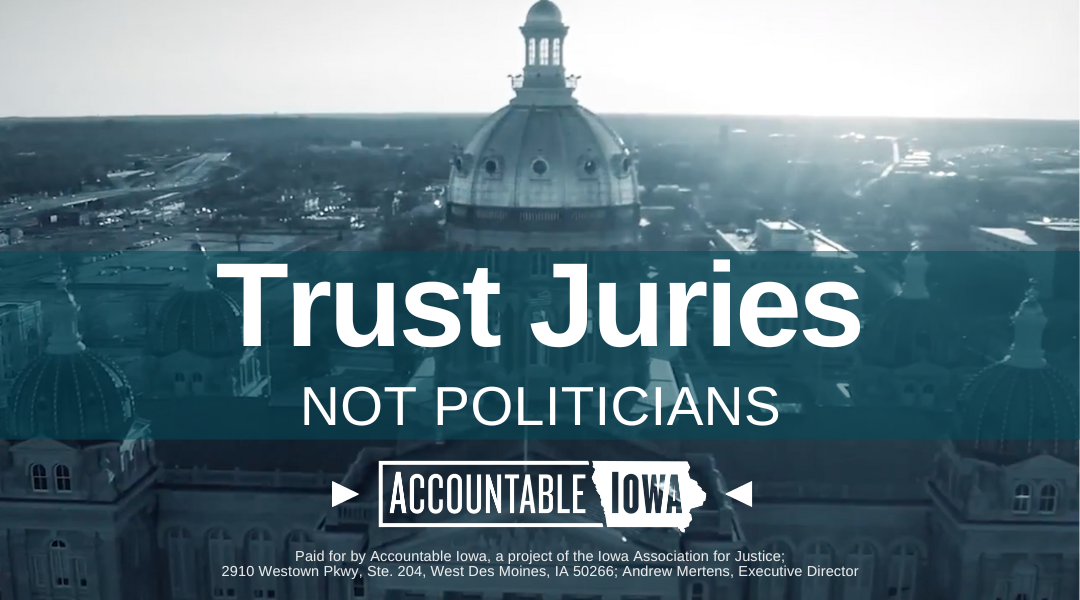As I write today from my kitchen table, I want to thank all of you for doing all you can to stay informed and keep each other safe and well. Thank you to everyone continuing to do the hard work of caring for and serving our communities.
This week I want to share a number of information pieces to keep you up-to-date, as the changes at the State and Federal level are happening quickly.
Yesterday afternoon, Governor Reynolds extended her recommendation for schools to remain closed until at least April 30, 2020. Prior to suspending the session, the Legislature waived missed school days up to April 13 and the Legislature gave the Governor authority to waive additional missed days. She can do this on a Statewide or district-by-district basis.
Following the Governor’s recommendation regarding school closure, the Legislative Council, which consists of House and Senate leadership, announced the suspension of the legislative session will be extended until at least April 30th.
COVID-19 Update
One of the most common questions the press consistently raises is, “Why hasn’t the Governor issued a Shelter-in-Place Order?”
According to Governor Reynolds, she is following the advice of public health experts who say that such a measure is not necessary at this time. The Governor has already taken significant action to mitigate the spread of COVID-19, such as non-essential business closures, suspending non-essential surgeries, and encouraging Iowans to stay at home and self-isolate. Many of the Shelter-in-Place Orders that have been implemented in other states cover what is already being done in Iowa. Given this, Iowa’s approach is both comparable and, in many cases, stronger.
Some of the reasons against a Shelter-in-Place Order in Iowa include:
- Iowa’s population density is much smaller than most states (The New York City metro area’s population density is nearly 100x larger than Iowa’s)
- Iowa does not utilize mass public transit which often spreads disease
- Iowa does not have large apartment buildings where thousands of people live
- A Shelter-in-Place Order would strain local law enforcement resources
Below are additional questions of frequent concern. If you have other questions, please do not hesitate to contact me.
Who decides who gets a COVID test?
Clinicians, with guidance from CDC and public health, make these determinations. Positive test results are then communicated back to health care providers and the Iowa Department of Public Health. It is critical to note those who are experiencing symptoms should call ahead to their health care provider’s office in order to protect our medical community and general public.
Where can health care providers find more testing resources?
The Iowa Department of Public Health has a number of ways to keep providers informed, including their webpage. In addition, health care providers can contact their hospital reference laboratory for testing availability.
For more information, visit https://idph.iowa.gov/Emerging-Health-Issues/Novel-Coronavirus/Healthcare or contact your local public health department.
Where can local health care providers go to find personal protective equipment (PPE)?
Providers in need of PPE should contact local public health agency or county emergency management agencies. They will make every effort to address the local needs.
What are the guidelines for making homemade face masks?
Please follow this guidance from the Iowa Department of Public Health on making homemade face masks.
Where can I find the most up to date information on COVID-19 in Iowa?
The Iowa Department of Public Health issues daily status reports on its website, idph.iowa.gov. The state has also created a website, coronavirus.iowa.gov, with information and resources.
What sort of assistance is available for workers?
Iowa Workforce Development (IWD) has made unemployment benefits available to workers affected by COVID-19. Additionally, IWD recently announced that Iowans seeking unemployment will no longer be required to use up their sick time or paid leave before receiving unemployment benefits.
What sort of assistance is available for small businesses?
The Iowa Economic Development Authority has announced multiple small business relief programs including:
- Small Business Relief Grants: Grant awards ranging from $5,000-$25,000 for businesses between 2 – 25 employees. (Application deadline has passed)
- Iowa Small Business Tax Deferral: The Iowa Department of Revenue is allowing sales/use and withholding tax deferral for businesses affected by COVID-19. (Application deadline has passed)
- Targeted Small Business Sole Operator Relief Fund: Grant awards ranging from $5,000-$10,000 for sole proprietorship or single-member LLCs that are also certified as Targeted Small Businesses. The business must have been in existence for 12 months prior to April 10, 2020.
More information about how Iowa is assisting businesses can be found at IowaBusinessRecovery.com.
Additional assistance has been made available through the Federal CARES Act. This includes an expansion of unemployment benefits to self-employed Iowans, business loans from the Small Business Administration, and tax deferral. More information can be found here.
Federal Response to COVID-19
This week I also participated in a teleconference with Federal officials. As a follow-up to the call I received some additional helpful information, which I am including below. These links have some excellent information for Individuals and Small Business owners.
The Internal Revenue Service has setup a website https://www.irs.gov/coronavirus with up-to-date guidance to help taxpayers, businesses, and others affected by the coronavirus.
Distribution of economic impact payments to individuals will begin in the next three weeks and will be distributed automatically, with no action required for most people. Social Security recipients, who are not typically required to file a tax return, will automatically receive economic impact payments, as well. For guidance, see Economic Impact Payments: What You Need To Know https://www.irs.gov/newsroom/economic-impact-payments-what-you-need-to-know.
The Small Business Administration is offering low-interest federal disaster loans for working capital to small businesses and private, non-profit organizations in all U.S. States and territories. Learn more at https://www.sba.gov/disaster-assistance/coronavirus-covid-19.
The CARES Act’s Paycheck Protection Program authorizes up to $349 billion for small businesses to be applied towards job retention and certain other expenses. Small businesses and eligible non-profit organizations, Veterans organizations, and Tribal businesses described in the Small Business Act are all eligible. Individuals who are self-employed or are independent contractors are eligible, as well, if they also meet program size standards.
Several of our local bankers are prepared to work with small businesses to utilize these programs. Please contact your local financial institutions for any assistance you may need.
For a top-line overview of the program, visit https://home.treasury.gov/system/files/136/PPP%20–%20Overview.pdf.
If you are a lender, use the following link https://home.treasury.gov/system/files/136/PPP%20Lender%20Information%20Fact%20Sheet.pdf.
Borrowers should use https://home.treasury.gov/system/files/136/PPP–Fact-Sheet.pdf. Additionally, applications for borrowers can be found at https://home.treasury.gov/system/files/136/Paycheck-Protection-Program-Application-3-30-2020-v3.pdf
The U.S. Department of Labor (DOL) published more guidance to provide information to employees and employers about how each will be able to take advantage of the protections and relief offered by the Families First Coronavirus Response Act (FFCRA). Please visit https://www.dol.gov/newsroom/releases/whd/whd20200328.
Absentee Requests to Iowa Voters
In response to concerns with the coronavirus, the Secretary of State’s Office plans to mail absentee ballot request forms to every active registered voter for the Primary Election on June 2nd. The request forms will be mailed mid-to-late April and will include prepaid postage to return the absentee ballot request to the voter’s county auditor.
Additionally, last week the Secretary of State extended the period for absentee voting from 29 days to 40 days. The first day for absentee voting will be April 23rd. Iowans will be able to request absentee ballots through May 22, 2020.
Iowans not registered to vote or who need to update their voter registration should do so as soon as possible to ensure the absentee ballot request is sent to the correct address.
Please continue to follow the guidelines we have all heard so many times: practicing social distancing, washing your hands, covering your cough/sneezes, and staying home if ill. We can all do our part to help limit the spread.












